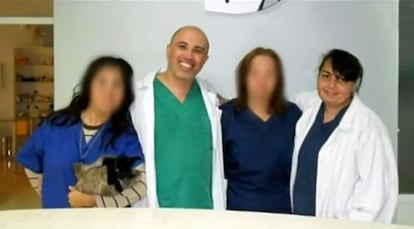The grisly tale of the Alicante vet who cremated his own wife
Marcelo Gurruchaga is suspected of murder, but with no body that is hard to prove

The patrons of the bar known as El Granaíno, in Benijófar — a small town of 4,200 residents in Alicante province — remember the events of that day quite clearly. The local veterinarian, Marcelo Gurruchaga, calmly finished his afternoon coffee at one of the establishment's pleasant outdoor tables. He talked business with an unknown person for about 10 minutes, and then left.
Two days later, he walked into the Civil Guard station holding a box full of ashes in his hands, and confessed that his 46-year-old wife had been dead for a week. He claimed that she died on the Thursday before Easter of a prescription drug overdose following a bout of depression over her excess weight. He said he tried to revive her for three whole hours at his veterinary practice, to no avail. Then, according to his testimony, he cut up the body and took the remains to an animal incinerator for cremation.
This gruesome tale fell apart under pressure from the couple's two children, who did not believe his story that their mother had gone away on an Easter vacation. Neither did the judge, who placed him in custody without bail while charges of homicide are investigated. The veterinarian has no record of domestic abuse.
In Benijófar it is hard to get anyone to talk about their only veterinary surgeon, a discreet and cheerful 45-year-old from Argentina who felt comfortable among all the wealthy British retirees living in the area. His neighbors wonder how he was able to hold himself together after his wife's death. For a whole week he led a double life, raising no suspicions among the locals. Francisco, the town's lottery seller, sold him a ticket two days after the death. "I noticed that the blinds were down at the clinic," he says. Over at another bar, called Lucas, Marcelo was last seen greeting a man on the night before his confession. He acted in a distant but polite manner. Another witness says he hung a sign on the door of his practice that read "Closed due to illness."
Gurruchaga claims his wife died
of a drug overdose following a bout
of depression
As José Segura, co-owner of El Granaíno, points out, Gurruchaga did not get into trouble and he appeared to have "an excellent relationship" with his wife, who was also from Argentina. "They were very much in love," says the man, who considered himself a friend of the family ever since their youngest son, 19, worked at his establishment as a waiter. The couple even had a beer there just a few hours before the incident. The bar owner insists that the alleged killer was a professional with a spotless reputation, and who treated neighbors' pets for free and took in stray dogs.
The business was going well, according to the locals. Gurruchaga and his wife had accumulated a solid client base of British and German clients since they opened their modern veterinary center in 2007. He performed the surgeries and she helped with the pet shop and the dog-grooming services. Their eldest daughter, 25, lent them a hand and the 19-year-old son was studying to be a vet, too. The couple were collecting résumés with a view to hiring vets who could speak English, and they were about to sign a lease on an apartment in the same building as the practice, so they could be closer to work, said a neighbor.
People who knew the victim personally do not believe the hypothesis that investigators consider most likely: that Marcelo's wife died during a failed liposuction procedure performed by her own husband at the clinic. The deceased woman was short in stature and weighed around 70 kilograms, according to several neighbors.
The defendant's lawyer later told the regional daily Información that his wife arrived in Spain weighing 55 kilos, and was now up to 95. The same newspaper also reported that the couple's children confirmed that their mother had a history of suicide attempts.
In the enigmatic tale of events, one fact stands out. On the Thursday before the Easter weekend, the day of his wife's death, Marcelo called the animal incineration center IPA, which had been servicing his business since 2008. He ordered an urgent cremation of a large dog, arguing he was in a hurry because the owners, who lived abroad, were leaving the country soon. Two days later, according to this company, he showed up with several closed bags at the ghostly industrial park Los Azárabes, some 10 kilometers from the clinic. He asked that the bags not be opened due to their advanced state of decomposition. He warned operators that it was a disagreeable sight. He also asked to get the ashes back.
He admits to cutting up the body and disposing of it in an animal incinerator
The vet waited patiently inside the building until the cremation was over, then carried the boxes with the ashes over to the trunk of his car. A company spokesman admitted that the operator did not check the contents of the bags because "there is no protocol on the issue."
A week later, Marcelo walked into the Civil Guard station at Almoradí, Alicante to give his version of events. He had chosen one of the most effective methods to destroy a corpse. "This requires time and determination. Normally, these acts are committed by people who have something to hide," explains Vicente Garrido, professor of criminology at Valencia University. "If she really did commit suicide, why did he dispose of the body?" he asks.
José Luis González Cussac, a professor of criminal law at the same university, notes that "without a corpse, it is very difficult to hand down a homicide sentence." The alleged killer could face no more than a small fine for illegal exhumation.
Tu suscripción se está usando en otro dispositivo
¿Quieres añadir otro usuario a tu suscripción?
Si continúas leyendo en este dispositivo, no se podrá leer en el otro.
FlechaTu suscripción se está usando en otro dispositivo y solo puedes acceder a EL PAÍS desde un dispositivo a la vez.
Si quieres compartir tu cuenta, cambia tu suscripción a la modalidad Premium, así podrás añadir otro usuario. Cada uno accederá con su propia cuenta de email, lo que os permitirá personalizar vuestra experiencia en EL PAÍS.
¿Tienes una suscripción de empresa? Accede aquí para contratar más cuentas.
En el caso de no saber quién está usando tu cuenta, te recomendamos cambiar tu contraseña aquí.
Si decides continuar compartiendo tu cuenta, este mensaje se mostrará en tu dispositivo y en el de la otra persona que está usando tu cuenta de forma indefinida, afectando a tu experiencia de lectura. Puedes consultar aquí los términos y condiciones de la suscripción digital.









































